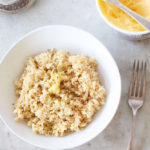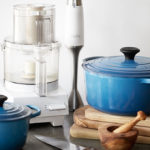
This tasty chameleon like grain can sway sweet or savory
To my delight I recently found out that this rich and creamy, mild flavored grain is the original, traditional form of couscous. I felt rather vindicated! Since I like to make millet as a substitute for wheat couscous in Mediterranean inspired dishes.
Aside from the tasty and easy to pair flavor, millet is an outstanding source of many minerals and nutrients. Just one cup of cooked millet will supply you with about 25% of your daily values of invaluable minerals including: copper, phosphorus, manganese and magnesium. In addition you’ll be getting plenty of fiber and phytonutrients in the form plant lignans such asenterolactone–which may protect against breast cancer.
Benefits from eating millet include:
- Lower blood pressure
- Cardiovascular protection
- Reduce asthma
- Reduce frequency of migraines
- Improve matrix of bones
- Repair body tissue and cells
- Substantially lower the Type 2 Diabetes Risk
- Prevent gallstones
- Cancer protection
Enjoy millet as a part of balanced meal, or with butter and berries to start your day. Whatever you do, be sure to add this wonderful, healthful grain into your rotation!



SOAKING GRAINS IS AN EASY AND VITAL STEP FOR GOOD HEALTH
All grains, nuts and seeds contain a series of anti-nutrients which act as natural pesticides, sprouting inhibitors and other essential factors for the health of the plant. Unfortunately when consumed by humans, unlike the multi-chamber stomachs of ruminants, the acids in our guts are not strong enough to brake those chemicals down effectively.
AS A RESULT THE PHYTIC ACID, TANNINS, GLUTEN-RELATED PROTEINS AND ENZYME-INHIBITORS IN UNSOAKED GRAINS WILL:
- bind with essential minerals in the gut, flushing them from your body
- block new mineral absorption
- irritate the gut
- inhibit digestion
- lead to bone loss
- cause allergies
- put stress on the pancreas
Altogether these effects can lead health problems — but can be prevented with one simple step.
During the soaking process the acids in vinegar or lemon juice help to eliminate anti-nutrient compounds while allowing the plant to sprout. The sprouted seed released from dormancy becomes a live food once again. Nuetralizing the seed-preserving compounds allows for the body to stay mineralized while being further fortified with essential minerals (meaning that your body cannot produce them) otherwise locked into the grain. Bio-available vitamin content increases, “tannins, complex-sugars, gluten and other difficult-to-digest substances are partially broken down into simpler components that are more readily available for absorption.” (source)
As you can see, this process is non-negotiable if you’d like to improve or maintain good health. The bonus is that your cooking times will be drastically reduced. By about half for most grains!
I’ll admit that I don’t soak and sprout my nuts and seeds. You really need a dehydrator for that, and due to considerations of space, time and energy, I’ve decided to let that slide. My diet contains a very small fraction of nuts and seeds compared to how much, and how often, grains play a role in my diet. This feels good to me–and it ends up saving me time!
TIPS FOR GOOD HEALTH AND EASE
- Soak for a minimum of 6 hours, but you can leave the grains in the same water for about 24 hours.
- If you’re not ready to cook when 24 hours is up, simply refill with fresh water and vinegar.
- Soak in a dark warm place, like a cupboard or oven (while turned off).
- Pour off the soaking liquid before cooking and rinse the grains at least once.
- For extra pure grains: pour off soaking liquid, add fresh water, stir well and let any bubbles or foam rise, pour water off. Repeat until all the impurities have been released and the water is clear.
- Soaked grains absorb water, decreasing cooking time and grain to water ratios. Once you’ve made soaked grains a few times you’ll get a better sense of water ratios and will know when to add less, or more.
- Store dry grains in a glass container with a tight lid, away from direct sunlight to prevent rancidity of the fragile oils contained in the seeds.




